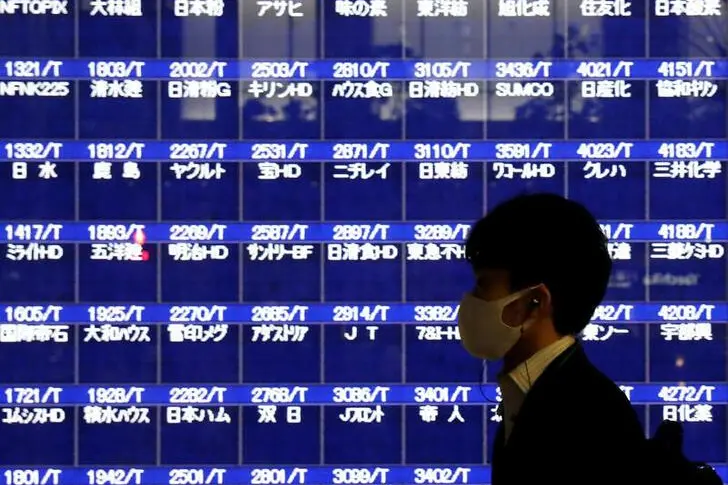PHOTO
SYDNEY - Asian shares slipped off record highs on Friday as investors took profits after a recent rally that was driven by hopes of U.S. economic stimulus by newly inaugurated President Joe Biden.
Sentiment was also hit by worries of new coronavirus restrictions in China which reported 103 COVID-19 cases on Friday.
Futures pointed to a bleak start for European and U.S. share markets. Eurostoxx 50 futures was down 0.4% while futures for Germany's Dax index slipped 0.3% and those for London's FTSE fell 0.2%. E-Mini futures for the S&P 500 stumbled 0.25%.
MSCI's broadest index of Asia Pacific stocks outside of Japan extended losses in afternoon trading to be last off 0.6% at 720.17 points following three straight sessions of gains.
The index is up a stellar 8.8% in January so far, after hitting an all-time high of 727.31 on Thursday.
Analysts expect Friday's losses to be short-lived as they predict a strong upswing in global growth supported by record low interest rates the world over.
"2021 begins with expectations of reopening in second-half, as the key macro theme and consensus forecasts project a V-shaped recovery in global growth and corporate earnings," Paul O’Connor who heads the UK-based multi-asset team at Janus Henderson.
"Although many countries and sectors will bear the scars of the COVID-19 shock for years to come, 2021 is expected to see some decisive steps down the road to recovery as restrictions on economic activity ease as the year progresses, unlocking pent-up consumer spending," O'Connor added.
The MSCI Asia ex-Japan index has jumped 3.7% so far this week, reflecting relief over an orderly transition of power in the United States and strong expectations that U.S. stimulus will provide continued support for global assets.
Republicans in the U.S. Congress have indicated they are willing to work with President Joe Biden on his administration's top priority, a $1.9 trillion U.S. fiscal stimulus plan, though some are opposed to the price tag.
Democrats took control of the U.S. Senate on Wednesday, though they will still need Republican support to pass the program.
Australia's benchmark index eased 0.3% while Japan's Nikkei fell 0.4%.
Chinese shares started on the backfoot with the blue-chip CSI300 index down 0.3% and Hong Kong's Hang Seng .HSI was off 1.4%.
Travel plans were in limbo for tens of millions of people in China's northern cities who have been under some kind of lockdown amid worries that undetected coronavirus infections could spread quickly during the Lunar New Year holiday, which is just weeks away.
Overnight on Wall Street, both the S&P 500 and Nasdaq Composite closed at record highs.
In currency markets, the U.S. dollar paused after three straight days of losses, though it is still down 0.7% so far this week.
Against the Japanese yen, the dollar has slipped 0.28% so far this week.
The commodity-sensitive Australian dollar is up 0.6% this week while the euro has climbed 0.8% in the period.
The greenback's recent slide has been led by investors ploughing money into higher-yielding currencies on optimism about a rapid economic recovery led by massive U.S. stimulus.
Popular cyptocurrency bitcoin fell to an almost three-week low on Friday on profit-taking and worries about extra regulations.
It is on track for its worst weekly performance since early 2020, down 12.3% so far.
In commodities, oil prices were weighed down by worries that new pandemic restrictions in China will curb fuel demand in the world's biggest oil importer.
Brent and U.S. crude were each 73 cents lower at $55.37 and $52.40 per barrel respectively.
Spot gold was down 0.6% at 1,859.4 an ounce.
(Reporting by Swati Pandey in Sydney and Jessica DiNapoli in New York; Editing by Shri Navaratnam & Simon Cameron-Moore) ((Jessica.DiNapoli@thomsonreuters.com; 646-223-4678;))





















